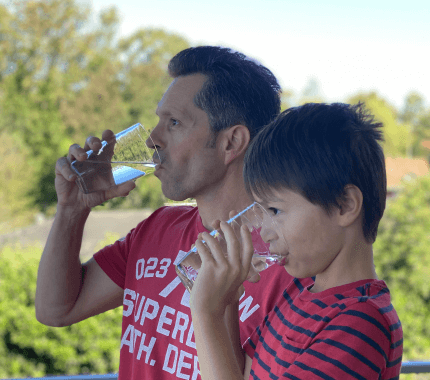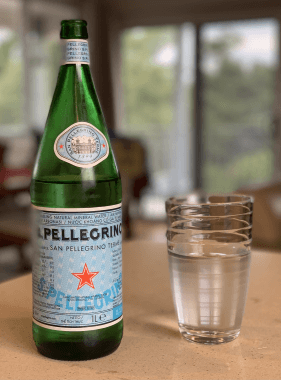Water and Health
Discover the Transformative Benefits of Water for Optimal Health and Wellness
Water and health is a topic that is well talked about and vitally important for optimum health, considering that our body is over 60% water.
The benefits of water and health
Water performs numerous functions in the body:

- It transports nutrients and oxygen through the body.
- It is essential for removing waste.
- It acts as a lubricant.
- It is vital for the digestive process.
- It helps to prevent constipation.
- It keeps the skin moist.
- Quenches your thirst.
- It helps to regulate body temperature through perspiration.
- Natural appetite suppressant.
The best sources of water in our diet are fresh fruit and vegetables and pure water, preferably filtered. Water is also one of the best choices for a beverage because it is convenient and affordable, and naturally occurring fresh spring water is full of dissolved minerals. The best part is that water has no calories!
How much water do we need?
The average person needs around two litres or approximately eight glasses (250ml) of water daily to replace what’s lost through breathing, sweat, and excretion. Keep in mind the more active you are and the hotter and dryer the weather, the more water your body requires. Your body may also need more water when eating a fibre-rich diet.
To calculate basic fluid needs, you can estimate them by body weight. For every kilogram of body weight, ingest 30-40 ml of water.
For example, a person weighing 70 kg (154 lb) will need 2-2.5 L of water daily.
Dehydration
An essential sign of water and health is dehydration. It only takes a 2% loss of body water to see some serious symptoms of dehydration. These symptoms include:
- Fatigue
- Headaches
- Dizziness and/or fainting
- Nausea
- Low blood pressure
- Flushing
- Rapid heart rate
If we keep losing water without replenishing it, these symptoms worsen. In the absolute worst case, it can be fatal.
Hydration indicator
One of the best ways to find out that your body is hydrated is by the colour of your urine. Colourless or slightly yellow urine indicates that your water intake is probably adequate. Conversely, dark yellow urine may indicate a need for more water.
Hyponatremia
Another vital sign of water and health is a problem that can occur called hyponatremia. This is when you consume too much water relative to sodium content.
Signs of hyponatremia include:
- Gastrointestinal (GI) discomfort that can include nausea and/or vomiting
- Headache
- Swollen hands and feet
- Confusion
Some of the symptoms above are similar to dehydration symptoms, and consuming more water could worsen the problem.
What I like to do, especially on a hot, dry day, is add a pinch of pink Himalayan rock salt or sea salt to our bottle of water.
Tips for achieving adequate water intake
I remember as a child, all I drank was water straight from the tap. Then, in my early teens, it changed somewhat. Soft drinks (soda) were advertised heavily on TV in the ’80s. So, soft drinks and flavoured milk were the norm. Then, in my late teens, while playing sports, I found that the more sports drinks and soft drinks I drank, the thirstier I became. So, I went back to drinking water and have never looked back. For me, the only drink that quenches my thirst is water. I drink a combination of purified still water and sparkling mineral water.

So far, we have covered some important facts about water and health. Here are some tips to help you achieve adequate water intake:
Carry a water bottle with you
Having a water bottle with you always reminds you to drink water throughout the day. Choose a bottle that is convenient to carry and easy to refill.
Set reminders
Use your phone or a timer to remind yourself to drink water regularly. Set reminders every hour or two to ensure you're consistently hydrating.
Drink water before meals
Make it a habit to drink a glass of water before each meal. Not only does this help with hydration, but it can also aid in portion control and digestion.
Flavour your water
If you find plain water boring, try squeezing the juice from a citrus fruit in your water, like lemon, lime, orange or mandarin, to add a different flavour. You can also opt for herbal teas or flavoured water options to make hydration more enjoyable.
Keep track of your intake
Use a water tracking app or simply keep a tally of how many glasses of water you consume daily. This can help you stay accountable and ensure you're meeting your hydration goals.
Make it a habit
Incorporate drinking water into your daily routine. For example, drink a glass of water as soon as you wake up and before, during and after exercising. Making it a habit makes you more likely to meet your water intake goals consistently.
Eat water-rich foods
Many fruits and vegetables, such as watermelon, cucumbers, oranges, and strawberries, have high water content. Including these foods in your diet can contribute to your overall water intake.
Monitor your urine colour
Pay attention to the colour of your urine. It indicates that you're adequately hydrated if it's pale yellow or clear. Dark yellow urine may be a sign of dehydration, so make sure to increase your water intake.
Drink water with every caffeinated or alcoholic beverage
Caffeine and alcohol can have a diuretic effect, causing increased urine production and potentially leading to dehydration. To counteract this, make it a habit to drink a glass of water alongside any caffeinated or alcoholic beverages. Try substituting sparkling mineral water for soft drinks (soda) and alcoholic beverages at social events.
Listen to your body
Pay attention to your body's signals for thirst. If you feel thirsty, it's a sign that you need to drink more water. Additionally, if you're engaging in physical activity, spending time in hot weather, or experiencing illness, increase your water intake accordingly.
For more information on water and health, click to view these articles from Precision Nutrition:
Research review: Water and weight loss
References:
Precision Nutrition